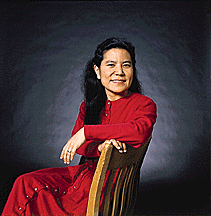

When Edwina Uehara found a message on her answering machine that the President of the University of Washington wanted to speak with her, she panicked.
"I was just granted tenure and I thought, 'Oh my gosh. There's a problem,'" she recalls. But her husband, a realist who doesn't even work in academe, calmed her immediately. "If it were bad news, he'd make your dean tell you," he said.
When the social work professor finally talked with President Richard McCormick, she learned she was one of five faculty awarded a 1996 Distinguished Teaching Award. "It is probably the most exciting thing that has ever happened to me," she says.
Well, maybe the second-most exciting, for a few weeks after that phone call, Uehara and her husband, Michael Smukler, flew to Nanking, China, to meet their new adopted baby girl, Emiko.
Her new daughter is Chinese, her husband's family has a European background and Uehara herself is Japanese American. The diversity of her home life mirrors what she teaches in the UW School of Social Work--social networking, mental health services and ethnographic research methods particularly as they relate to ethnic minorities.
But the classroom wasn't Uehara's original career destination. After she earned her B.A. at Eastern Washington and her M.S.W. at Michigan, she spent 13 years in the field, much of it with a non-profit policy research center in Chicago.
"I didn't have teaching on my mind at all," she admits. But after earning her Ph.D. at the University of Chicago, she was a postdoctoral fellow there, teaching a new course in ethnographic research. "I had to put the course together from scratch. Even the planning was exciting. Then I had a small group of dedicated graduate students. Every session was explosive with excitement."
Uehara was hooked on teaching. When an opening came up at the University of Washington in 1990, she got the tenure-track position. Since then, Uehara has taught both quantitative and qualitative research courses, seminars on interpretive methods and on social work administration and management, plus graduate research seminars.
In nominating her for the award, Social Work Dean Nancy Hooyman noted Uehara's "multidisciplinary approach to teaching, in which she effectively integrates issue of race, class, gender and sexual orientation; her energy and extensive preparation; and her responsiveness to student feedback."
Her students are ecstatic in their praise. "As a student training to teach, I find Professor Uehara's abilities as a teacher to be examples of what the University offers at its best," says one. "She was able to make what can be very dry material come alive," writes another.
One of her teaching secrets is individual attention. She fosters work in small groups and usually requires individual meetings with each student. "Students are not empty vessels. They have life trajectory and a learning trajectory. You need to know them both," she declares.
Uehara is a master in taking those life experiences and weaving them into her coursework. A few years ago, when there were racial tensions in the school, Uehara had to deal with the anger in her classroom. "The students weren't learning," she says. "I had to stop to deal with the issues.
"It was the scariest moment for me in teaching. The students were very emotional. We had to lay ground rules on how to do it." Not only did tensions ease, but the students were so impressed with Uehara that they voted her the best teacher in the school that year.
Uehara herself has experienced plenty of diversity as a student. Her father was in the military, and she attended 13 different schools between kindergarten and her junior year of high school. Some of those schools were in Japan and Thailand.
Of her experiences at American schools in foreign lands, she says it was "a gift. It shaped me forever." The diversity of the student body made a profound impact on her. "If I could send every American high school student overseas for a year, I would."
Looking over her field, Uehara at times is pessimistic, especially when she sees the impact of managed care on mental health services in ethnic minorities. "I see care to chronically mentally ill groups falling through the cracks," she warns.
But there is optimism as well. "Social work is an applied area. We believe in human agency and the potential for change," she says. And this optimism, this belief in humanity, is perhaps the key to Uehara's great success in the classroom and in research. As one of her students put it, "She has a great mind and an even bigger heart."--Tom Griffin, Columns Magazine
Send a letter to the editor at columns@u.washington.edu.
Return to Best of 1996 Home Page